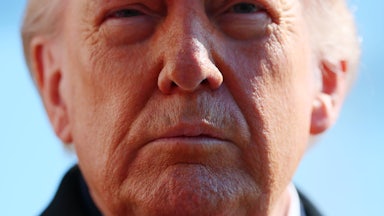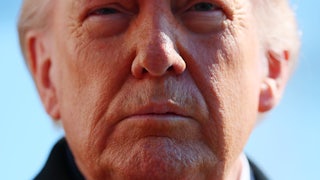Horse racing is one of America’s oldest sports yet one of the least scrutinized. With a fatality rate for jockeys that outpaces that of NASCAR drivers and the constant specter of horse deaths on the track, federal lawmakers stepped in recently to enact higher safety standards for the sport. A coalition of racetracks and states is now asking the Supreme Court to intervene—and to breathe new life into a moribund constitutional doctrine along the way.
At issue in Oklahoma v. United States is a bipartisan law that Congress enacted in 2020 to address what it saw as widespread issues in the thoroughbred horse racing industry, including a series of high-profile doping scandals and abnormal rates of track deaths at major racetracks. Three hundred and thirty-three horses died from racing injuries across the country in 2020, according to watchdog groups.
To address the issue, lawmakers effectively nationalized horse racing regulations and placed the authority to review track safety and horse medications in the Horseracing Integrity and Safety Authority, or HISA. Congress invested it with a variety of powers, including the ability to issue subpoenas, craft rules, and enforce civil penalties against violators. The new regulatory body is not a federal agency, however. Instead, the act described it as a “private, independent, self-regulatory, nonprofit corporation,” whose rules must be approved by the Federal Trade Commission.
Shortly after the act’s passage, a coalition of horse racing groups sued the federal government in Texas to argue that the law creating HISA violated, among other things, the nondelegation doctrine. That doctrine, a largely dormant principle in American constitutional law, generally holds that no branch of government can transfer its powers to another branch of government. In other words, Congress cannot simply give the executive branch the power to write laws, the executive branch can’t give lawmakers the ability to prosecute crimes, and the courts can’t allow either of them to hold criminal or civil trials.
What counts as an impermissible delegation, however, has been a sticking point. Since the early twentieth century, Congress has given more discretion to the executive branch when formulating policy on highly technical subjects. Lawmakers don’t have the time, expertise, or inclination to individually approve drugs instead of the Food and Drug Administration, or set interest rates instead of the Federal Reserve, or review corporate mergers instead of the Federal Trade Commission.
This approach to governance drew some resistance in the early 1930s when conservative justices on the Supreme Court struck down significant portions of Franklin D. Roosevelt’s New Deal. The court eventually acquiesced to complex federal agencies by adopting the “intelligible principle” standard, which holds that Congress can delegate rulemaking power to the executive branch so long as it provides an intelligible principle for the executive branch to follow. Armed with that broad standard, federal agencies have fended off every nondelegation challenge since 1935.
Some conservatives on the Supreme Court have since tried to revive the nondelegation doctrine by arguing that the pendulum has swung too far in the executive branch’s favor. Part of this approach stems from a broader hostility to federal regulatory power, which the court has tried to limit through the “major-questions doctrine” and other recent rulings. Some justices, notably Justice Neil Gorsuch, have also argued for reviving the nondelegation doctrine on more democratic grounds.
“The Constitution promises that only the people’s elected representatives may adopt new federal laws restricting liberty,” he wrote in a dissent in Gundy v. United States, a 2019 case involving federal sex-offender restrictions established by the Sex Offender Registration and Notification Act, or SORNA. “Yet the statute before us scrambles that design. It purports to endow the nation’s chief prosecutor with the power to write his own criminal code governing the lives of a half-million citizens. Yes, those affected are some of the least popular among us. But if a single executive branch official can write laws restricting the liberty of this group of persons, what does that mean for the next?”
Other justices have pushed back, noting the immense practical consequences that a revived nondelegation doctrine would have after nearly a century of governance under the intelligible principle test. “Indeed, if SORNA’s delegation is unconstitutional, then most of government is unconstitutional—dependent as Congress is on the need to give discretion to executive officials to implement its programs,” Justice Elena Kagan wrote for the majority in Gundy. “Consider again this Court’s long-time recognition: ‘Congress simply cannot do its job absent an ability to delegate power under broad general directives.’”
The horse racing dispute does not directly jeopardize that status quo for administrative agencies. Instead, the plaintiffs argue that HISA is unconstitutional under what they describe as the private nondelegation doctrine. They told the court that just as the branches of government can’t delegate their powers to another branch, neither are they allowed to delegate those powers to private, nongovernmental entities.
The Fifth Circuit Court of Appeals ultimately sided with the plaintiffs in the 2021 case and ruled that HISA was unconstitutional. “A cardinal constitutional principle is that federal power can be wielded only by the federal government,” Judge Kyle Duncan wrote for the three-judge panel in 2022. “Private entities may do so only if they are subordinate to an agency. But the [Horseracing Integrity and Safety] Authority is not subordinate to the FTC. The reverse is true. The Authority, rather than the FTC, has been given final say over HISA’s programs.”
In response, Congress quickly amended the law in 2022. No longer was the FTC required to simply rubber-stamp and promulgate HISA’s rules; instead, it could now “abrogate, add to, and modify” any regulations proposed by the group. A coalition of states, racetracks, and other horse racing–related groups filed a new lawsuit to challenge the revised law, but the Sixth Circuit Court of Appeals rejected their challenge in a ruling last March.
“Sometimes government works,” Judge Jeffrey Sutton wrote for the panel. He noted that the revised law was the product of a successful dialogue of sorts between Congress and the courts over the scope of the law’s power. “The Horseracing Authority is subordinate to the agency,” he concluded, noting the changes. “The Authority wields materially different power from the FTC, yields to FTC supervision, and lacks the final say over the content and enforcement of the law—all tried and true hallmarks of an inferior body.”
That did not satisfy the state of Oklahoma and its allies, however. They asked the Supreme Court to intervene in November, claiming that HISA’s structure still left too much governmental power in the hands of private actors. Though the FTC now has strengthened powers to review HISA’s rules and regulations, it can still only review them to determine if they are “consistent” with the statute that created the agency. Oklahoma and the other plaintiffs argue that this means HISA can impose policy preferences on the government even if the FTC disagrees.
“The FTC’s ability to amend already-existing rules at some point down the road does nothing to prevent the Authority from determining the content of federal law in the first place, even over policy objections from the FTC,” the plaintiffs argued, quoting from earlier Supreme Court precedents. “The ‘power to make the law ... necessarily involves a discretion as to what it shall be.’”
Bracketing the dispute are broader power struggles between the states and their horse racing regulatory bodies, which lost significant power after HISA’s creation, and reform-minded groups that pushed for changes to the patchwork system of rules that existed before 2020. But the Supreme Court may have its own reasons for taking up the case. In 2022, the justices declined to hear a case challenging part of the Affordable Care Act’s changes to Medicaid on private nondelegation doctrine grounds. But Gorsuch and Justices Samuel Alito and Clarence Thomas wrote separately to note that while that specific case wasn’t worthy of their attention for other reasons, the underlying matter was worth revisiting. “Unfortunately,” Alito wrote in a statement on the denial of review, “the case presents threshold questions that could complicate our review of that important question, but the statutory scheme at issue here points up the need to clarify the private non-delegation doctrine in an appropriate future case.”
Bolstering the private nondelegation doctrine is not likely to upend modern American governance, and certainly not to the degree that reviving the core version of the doctrine would. But it could give some of the court’s conservatives an opportunity to return it to a more central place in the nation’s constitutional discourse. That, in turn, could open the door to further moves against the “administrative state” that so many conservative legal scholars and activists have criticized. The justices will likely announce their decision on whether to hear the case in the next few months.








